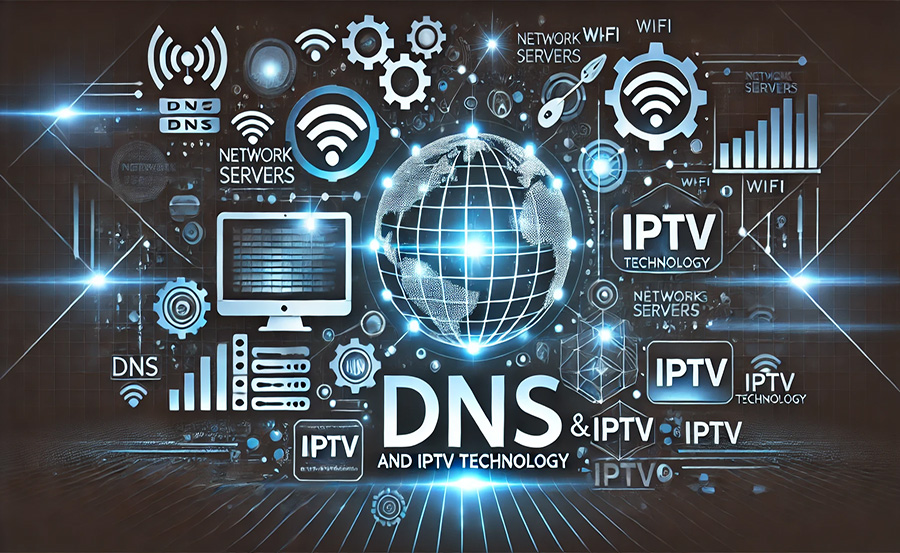As the digital landscape evolves, so do the technologies that power it. The intersection of DNS (Domain Name System) and IPTV (Internet Protocol Television) represents a critical area for innovation, particularly as streaming services continue to dominate how we consume media. With 2025 on the horizon, understanding the emerging trends in DNS and IPTV will be crucial for service providers, developers, and consumers alike. This article delves into the future of DNS and IPTV, highlighting key trends and advancements poised to shape the industry. want Buy 1 Year IPTV Subscription
Understanding the Role of DNS in IPTV
DNS serves as the internet’s address book, translating user-friendly domain names into IP addresses that devices can recognize. For IPTV services, DNS plays a vital role in:
- Efficient Content Delivery: Ensuring viewers connect to the closest and fastest server.
- Geo-Restriction Management: Enabling or bypassing region-based content locks.
- Low-Latency Streaming: Reducing buffering and lag by optimizing network paths.
As IPTV services strive to deliver ultra-high-definition (UHD) and real-time sports streams, DNS infrastructure will need to adapt to meet rising performance demands.
Key Trends in DNS and IPTV for 2025
1. Adoption of DNS-over-HTTPS (DoH) and DNS-over-TLS (DoT)
- What It Is: These technologies encrypt DNS queries, improving user privacy and security.
- Impact on IPTV:
- Enhanced data protection for IPTV subscribers.
- Mitigation of ISP-level throttling or content blocking.
2. Edge Computing and Localized DNS Servers
- What It Is: Edge computing involves placing servers closer to users to reduce latency.
- Impact on IPTV:
- Faster content delivery for live sports and 4K streams.
- Improved reliability during high-traffic events, like global sports tournaments.
3. AI-Powered DNS Optimization
- What It Is: Artificial Intelligence (AI) will analyze network traffic patterns to dynamically select the fastest DNS routes.
- Impact on IPTV:
- Enhanced streaming quality by avoiding congested paths.
- Smarter geo-unblocking for region-specific content.
4. Integration of IPv6

- What It Is: IPv6 expands the address space, accommodating more devices in a growing connected world.
- Impact on IPTV:
- Improved scalability for IPTV platforms.
- Smoother streaming for users in IPv6-native networks.
5. Emergence of Decentralized DNS
- What It Is: Decentralized DNS systems use blockchain technology to distribute DNS management.
- Impact on IPTV:
- Increased resilience against DNS-based attacks.
- Better transparency for consumers regarding DNS usage and censorship.
6. Focus on Multi-CDN Strategies
- What It Is: IPTV providers will increasingly rely on multiple Content Delivery Networks (CDNs) for redundancy and speed.
- Impact on IPTV:
- Optimized load balancing for better streaming experiences.
- Seamless failover during server outages.
7. Advanced Geo-Unblocking Techniques
- What It Is: DNS services tailored for streaming will refine their methods to bypass geo-restrictions without triggering platform detection.
- Impact on IPTV:
- Wider access to global sports and entertainment content.
- Less reliance on VPNs for content unblocking.
8. 5G and DNS Adaptation
- What It Is: With 5G networks expanding, DNS systems must adapt to handle faster speeds and lower latencies.
- Impact on IPTV:
- Near-instantaneous streaming for mobile IPTV users.
- Enhanced performance in remote or underserved areas.
9. Environmental Sustainability in DNS and IPTV
- What It Is: Companies will prioritize eco-friendly practices, such as energy-efficient data centers.
- Impact on IPTV:
- Reduced carbon footprint of streaming services.
- Adoption of green DNS solutions powered by renewable energy.
10. Customizable SmartDNS Solutions
- What It Is: Tailored DNS services that offer advanced controls for specific use cases, such as parental controls or optimized gaming.
- Impact on IPTV:
- Personalized viewing experiences for users.
- Enhanced control over content accessibility.
Challenges Ahead for DNS and IPTV
While the future looks promising, there are challenges that the industry must address:
- Cybersecurity Threats:
- DNS remains a target for Distributed Denial-of-Service (DDoS) attacks.
- IPTV services must strengthen their DNS infrastructure to counter these threats.
- Regulatory Hurdles:
- Geo-restrictions and content licensing disputes will continue to influence DNS development.
- Striking a balance between compliance and user access will be crucial.
- Rising Data Demand:
- UHD and 8K streaming will place unprecedented strain on DNS and network resources.
- Investments in scalable DNS systems will be necessary.
How to Prepare for These Trends
For IPTV Providers:
- Invest in Edge Infrastructure: Deploy DNS servers closer to end-users for reduced latency.
- Enhance Security Measures: Adopt encrypted DNS protocols and monitor for malicious traffic.
- Embrace AI and Automation: Use AI-driven DNS optimization tools for dynamic traffic management.
For End-Users:
- Choose a Low-Latency DNS Service: Opt for services like Cloudflare DNS, SmartDNSProxy, or OpenDNS.
- Adopt IPv6-Compatible Devices: Future-proof your setup with hardware that supports the latest standards.
- Stay Informed About Privacy: Use DNS-over-HTTPS or DNS-over-TLS for secure browsing.
Conclusion
The future of DNS and IPTV is intertwined with emerging technologies and evolving consumer expectations. By 2025, advancements such as AI-driven optimization, decentralized DNS, and 5G integration will redefine how we stream and interact with IPTV platforms. Staying ahead of these trends will be essential for both providers and users to enjoy a seamless, secure, and high-quality streaming experience.
How to Stream IPTV for Community Learning Programs

